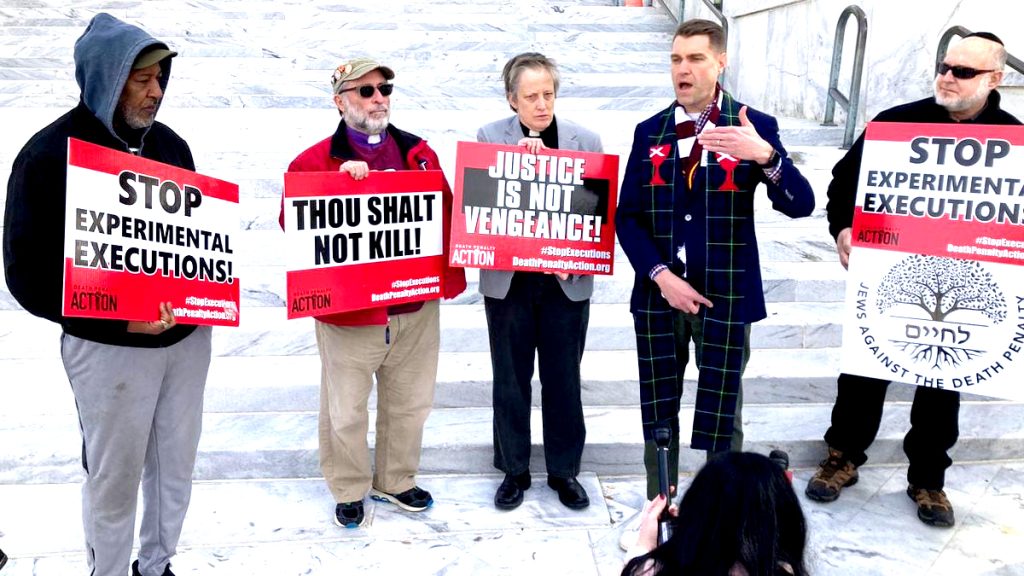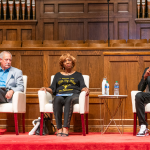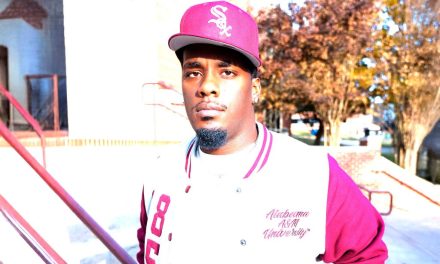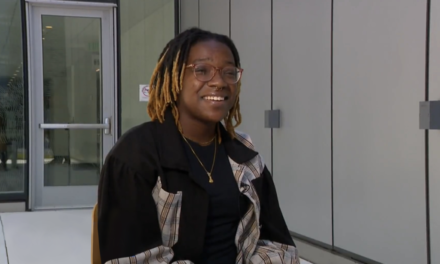By Mike Cason
More than 130 pastors, ministers, and faith leaders endorsed a letter delivered to Gov. Kay Ivey on Monday urging the governor to stop the first-ever execution by nitrogen hypoxia, scheduled for Thursday in Alabama.
“We urge you to immediately pause the scheduled execution of Kenneth Smith, scheduled for January 25th, and demand greater transparency around the use of nitrogen hypoxia,” says the letter, whose supporters represented more than a dozen Christian denominations, as well as leaders from the Jewish and Muslim faiths.
“Please do not let Alabama proceed with the untested and risky execution method. God’s Word is clear: all life is precious. Where there is life, there is hope.”
Pam Bye, director of constituent services for Ivey, accepted the letter in the hallway of the State Capitol outside the governor’s office.
The state is scheduled to execute Kenneth Eugene Smith during a 30-hour window that starts at 12 a.m. Thursday. A redacted protocol of the new execution method calls for the inmate to breathe nitrogen through a mask, depriving him of oxygen. The protocol says nitrogen will be administered for 15 minutes, or five minutes following a flatline indication on the EKG, whichever is longer.
The Legislature approved nitrogen hypoxia executions in 2018. No state has ever used the method and Alabama was silent about how it would work until releasing the redacted protocol in August 2023 when the attorney general’s office asked the Alabama Supreme Court to authorize Smith’s execution.
Smith is asking federal courts to block the execution. In a case before the U.S. 11th Circuit Court of Appeals, Smith’s lawyers argue that Alabama’s plan for carrying out the execution carries uncertainties and risks, including that air could leak in around the mask and prolong the execution or cause suffering short of death, such as leaving Smith in a vegetative state or causing a stroke. They also raised the concern that Smith could vomit into the mask during the execution and choke.
Alabama Solicitor General Edmund LaCour told the court the method would be painless and humane. He cited the statements from an expert witness who has assisted in nitrogen hypoxia suicides.
Smith’s spiritual advisor, Rev. Jeff Hood, who plans to pray with Smith in the execution chamber, has raised concerns about the potential hazards of the procedure. Hood’s lawyer sent a letter to the warden at Holman Correctional Facility in Atmore, where the execution is scheduled to take place, demanding safeguards for him and others who will be in the chamber.
His list of demands included the availability of oxygen sources for those in the chamber and having paramedics and ambulances at the prison in case of an emergency.
The faith leaders, in their letter delivered on Monday, raised the same concerns.
“As you know, nitrogen hypoxia is an untested and experimental procedure that poses potential undue risks to spiritual advisors who wish to accompany the condemned individual in the execution chamber, and other prison personnel and witnesses,” they wrote.
The letter later says, “We share the belief that the spiritual journey at the end of one’s life is sacrosanct and needless suffering at the hands of the State where we live and worship demands our response.”
Smith was twice convicted by juries for the murder-for-hire of Elizabeth Dorlene Sennett in her home in Colbert County in north Alabama in 1988. Sennett, a pastor’s wife, was beaten and stabbed repeatedly. Smith, who was hired by the victim’s husband to commit the slaying, confessed to his role in the crime and has been on death row since 1996.
Alabama tried to execute Smith by lethal injection in November 2022 but called off the procedure because the execution team could not start the intravenous lines for the injections. Smith claimed he suffered physical and psychological pain because he was strapped to a gurney and poked with needles for several hours during the unsuccessful attempt to tap his veins.
In a lawsuit seeking to block a second attempt at lethal injection, Smith said the state had an alternative in nitrogen hypoxia. At the time of the lawsuit, it was unclear when the protocol would be ready. Smith’s lawyers say he still believes nitrogen hypoxia is a potential alternative but that the state’s protocol does not adequately safeguard against potential failures in the plan.
Speaking on the Capitol steps Monday morning before carrying the letter to the governor’s office, Rev. Shane Isner of the First Christian Church (Disciples of Christ) in Montgomery, mentioned the biblical story of Pontius Pilate, the Roman governor who presided over the trial of Jesus before the crucifixion.
“We urge our governor, remembering another governor in my religious tradition who was in a hurry to wash his hands of someone else’s life, we ask this governor to pause this execution,” Isner said. “Why be in such a hurry to execute this man? It’s not needed. Prisoners are not guinea pigs. They remain made in God’s image. A God, we remind you, who is not in a hurry to judge, to condemn, execute. And so we shouldn’t be either.”











